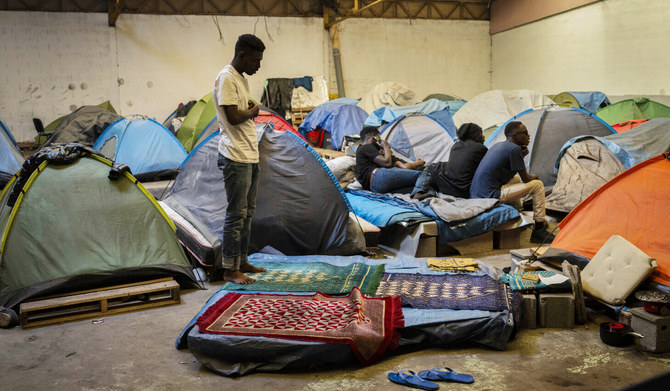TIJUANA, Mexico: From Algeria, Syria, Yemen and Afghanistan, citizens of distant, Muslim countries wait for US asylum at a shelter in the Mexican border city of Tijuana -- more used to seeing migrants from Latin America than the Middle East.
At the Assabil Inn, Mexico's first shelter catering for US-bound Muslim migrants, the backstories of the guests are as varied as the assortment of languages they speak.
"Almost everybody follows the same faith. So it feels like you're among your brothers and sisters," Maitham Alojaili, a 26-year-old who fled civil war-wrecked Sudan, told AFP before joining Friday prayers at the facility's mosque.
"People get kidnapped. Anything could happen. Sometimes, when you leave home, there's a very high chance that you don't come back," Alojaili said of the circumstances that compelled him to leave everything behind in search of a better life far away.
Data released this week by Mexico's National Migration Institute said some 1.39 million people from 177 countries have traveled through the country so far this year, trying to reach the United States without entry papers.
The figure represents almost the whole world -- the United Nations has 193 member states.
The majority came from Venezuela, Guatemala, Honduras, Ecuador and Haiti.
Increasingly, migrants from the Middle East and North Africa also undertake the perilous route via South and Central America.
For many, it includes a journey on foot through the dangerous Darien Gap, a dense jungle on the Colombia-Panama border replete with dangerous animals, criminals and human traffickers.
Yusseph Rahnali, a 31-year-old Algerian, told AFP he opted for the United States "because they accept everybody."
Europe is not an option, he said, because of visa requirements. Instead, he flew visa-free to Ecuador before crossing seven other countries to Mexico where he awaits news on the US asylum process.
Migration is at the heart of the campaign for the US presidential election in November.
Seeking re-election, incumbent Joe Biden signed a decree this month shutting down the border to asylum seekers after certain daily limits are reached.
On Tuesday, in an attempt to balance the crackdown criticized by the left and human rights groups, he announced a new potential citizenship path for immigrants married to US nationals -- which was in turn slammed by conservatives.
In Tijuana, 29-year-old Afghan journalist Fanah Ahmadi told AFP he traveled to Brazil on a humanitarian visa, then through "nine or ten other countries" to get to Mexico.
"There are many difficulties on the way but I am still grateful that... today, I am here," said Ahmadi of the Assabil Inn, where migrants receive food and shelter, "and we are near the border as well."
The Inn, opened in 2022, can house up to 200 people and allows Muslims to pray and eat halal. A stay can last from one week to seven months.
"Muslims have their home here in Tijuana," said founder Sonia Garcia, a Mexican who converted to Islam through marriage.
In 2023, a record 2.4 million people crossed the US-Mexico border without travel documents, according to US figures.
The flow hit a high of 10,000 people per day in December, which has since been reduced as both countries have cracked down.
For purposes of statistics, migrants from Muslim countries are grouped by US officials into a category labeled "other," due to their small number compared to those from Latin America, India or Russia.
Trump, as US president, banned migrants from Muslim countries in a measure that has since been overturned.
On the campaign trail he has ramped up his anti-immigration rhetoric, saying migrants were "poisoning the blood" of the United States.



























